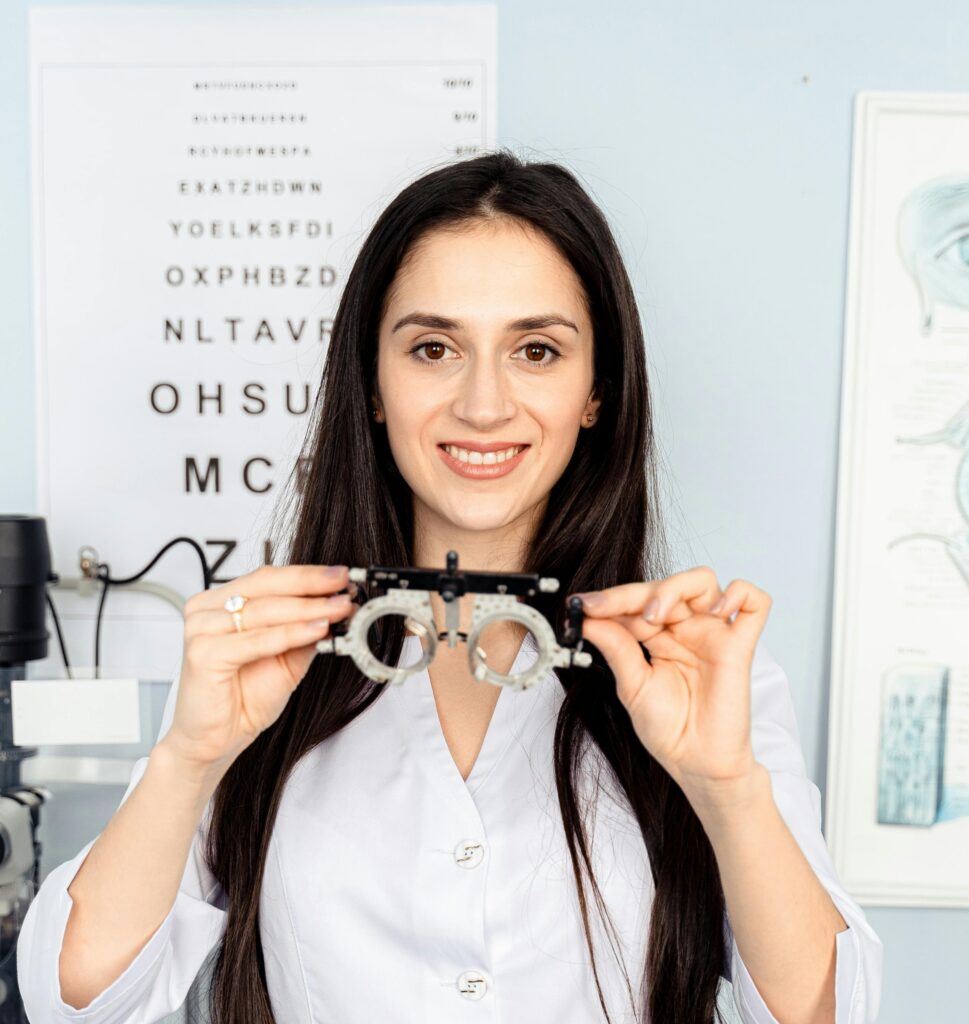Many people struggle with vision problems but don’t realize they need prescription glasses until their symptoms worsen. Ignoring blurry vision, frequent headaches, or difficulty reading can lead to eye strain and long-term vision issues. Whether you’re experiencing minor discomfort or significant vision changes, getting a vision screening at the best optical store can help you determine if you need glasses.
At Thind Eye Hospital, our ophthalmology specialists provide comprehensive eye exams, prescription glasses consultations, and contact lens consultations to ensure you get the right vision correction. In this guide, we’ll explore the most common signs that indicate it’s time to get your eyes checked.

Common Signs You Need Prescription Glasses
1. Blurry Vision at Any Distance
If objects appear blurry up close or far away, it could be a sign of refractive errors such as:
-
- Myopia (Nearsightedness) – Difficulty seeing distant objects.
-
- Hyperopia (Farsightedness) – Trouble focusing on close-up objects.
-
- Astigmatism – Blurry or distorted vision due to an irregular cornea shape.
If you’re squinting or struggling to read signs, books, or screens, visit a vision screening specialist for an eye exam.
2. Frequent Headaches and Eye Strain
Uncorrected vision problems force your eyes to work harder, leading to headaches, eye fatigue, and discomfort. If you often experience headaches after reading, using screens, or working under bright lights, it may be time for a prescription glasses consultation.
3. Difficulty Seeing at Night (Night Blindness)
Struggling to see clearly in dim lighting or while driving at night could indicate:
-
- Nearsightedness
-
- Cataracts
-
- Vitamin A deficiency
Worsening night vision is a serious concern and should be checked by an eye specialist immediately.
4. Eye Strain and Fatigue
Do your eyes feel tired, dry, or sore after long hours of reading, computer work, or driving? Digital eye strain is a growing problem, especially for those who spend extended hours on screens.
Prescription glasses with blue light protection can reduce strain and improve comfort.
5. Double Vision
Seeing double images can be a sign of:
-
- Uncorrected refractive errors
-
- Muscle imbalances (strabismus)
-
- Neurological issues
- Neurological issues
Double vision should never be ignored. Visit the best ophthalmology clinic for an evaluation.
6. Squinting to See Clearly
If you find yourself squinting frequently, it means your eyes are struggling to focus. While squinting temporarily improves clarity, it can also cause eye fatigue and wrinkles. Getting the right prescription glasses can eliminate the need to strain your eyes.
7. Holding Books or Screens Too Close or Too Far
If you move objects closer to see better, you might be nearsighted. If you hold objects farther away, you may be farsighted. Either way, these habits indicate a need for vision correction.
8. Sensitivity to Light
If bright lights cause discomfort or pain, it could be a sign of:
-
- Astigmatism
-
- Cataracts
-
- Eye infections
-
- Migraines
- Migraines
An eye doctor consultation can help determine the cause and suggest solutions like prescription sunglasses or corrective lenses.
9. Struggling with Reading Small Text
If reading fine print has become difficult, you might be developing presbyopia—an age-related condition where the eye loses its ability to focus on close objects. Reading glasses or progressive lenses can help.
10. Eye Redness, Watering, or Irritation
Constant redness, watering, or irritation may not always mean an infection. It could be a symptom of eye strain, digital screen exposure, or vision problems. An eye exam can identify the cause and recommend the best solution.
Why You Shouldn’t Ignore Vision Problems
Delaying an eye check-up can lead to:
-
- Worsening eyesight
-
- More severe headaches and discomfort
-
- Increased risk of accidents (especially while driving)
-
- The strain on eye muscles leads to long-term damage
- The strain on eye muscles leads to long-term damage
At Thind Eye Hospital, our experts provide accurate vision screening to determine the best prescription for glasses or contact lenses.
Choosing the Right Prescription Glasses in Jalandhar
If your eye test confirms that you need glasses, selecting the right pair is crucial. Here’s how to choose:
1. Visit a Trusted Optical Store
For high-quality lenses and frames, choose the best optical store in Jalandhar that offers:
-
- Accurate eye testing
-
- Wide range of frames
-
- Lens coatings (anti-glare, blue light filter, UV protection)
- Lens coatings (anti-glare, blue light filter, UV protection)
2. Get the Right Lens Type
Your prescription will determine the lens type:
-
- Single-vision lenses – For nearsightedness or farsightedness.
-
- Bifocals or progressive lenses – For presbyopia or multiple vision corrections.
-
- Computer glasses – Reduce strain from digital screens.
3. Consider Contact Lenses as an Alternative
If you prefer glasses-free vision, ask about contact lens consultations. Options include:
-
- Daily disposables
-
- Monthly lenses
-
- Toric lenses for astigmatism
- Toric lenses for astigmatism
4. Protect Your Eyes with Special Coatings
-
- Anti-glare coating – Reduces reflections and improves clarity.
-
- Blue light filter – Protects against screen-related eye strain.
-
- UV protection – Shields your eyes from harmful sun rays.
Book Your Vision Screening Today
If you’re experiencing any of these symptoms, don’t wait. Schedule an eye check-up at Thind Eye Hospital for expert vision screening, prescription glasses consultation, and contact lens options. Clear vision is essential for daily life, work, and safety—get your eyes tested today for the best eye care in Jalandhar.


